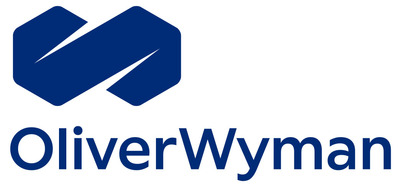|
16.02.2022 19:14:00
|
Aviation Embarks on a Decade of Growth, But Emissions May Get in the Way, Oliver Wyman Reports
NEW YORK, Feb. 16, 2022 /PRNewswire/ -- After struggling with COVID for more than two years, the aviation industry is set to rebound — with the fleet growing 4% per annum over the next 10 years, according to Oliver Wyman's Global Fleet & MRO Forecast 2022-2032. But as pent-up global demand pushes air travel to pre-pandemic levels by 2023, the industry will once again have to confront rising carbon dioxide emissions and its lack of immediate solutions to reduce them.
The widely anticipated report, now in its third decade, digs deep into commercial aircraft deliveries and inventories — as well as aerospace production — to provide a comprehensive view of the size and composition of the commercial fleet over the next decade. The outlook delineates growth both globally and from a regional perspective. Additionally, it analyzes the maintenance, repair, and overhaul services (MRO) that the fleet will require.
Key findings for the 2022-2032 report include:
- The global fleet is set to grow to 38,100 aircraft by 2032 — a compound growth rate of 4.1% over the decade.
- Narrowbody aircraft will make up a larger share of the fleet — 64% in January 2032 versus 58% in January 2020 — as the slow recovery of international traffic after COVID-19 is depressing the number of widebodies in service.
- The fleet won't reach its pre-pandemic peak of almost 28,000 until the first half of 2023
- The dedicated global cargo fleet grew 3% and conversions of passenger aircraft to freight carriers broke records, thanks to a double-digit expansion in demand with the COVID-related explosion in online shopping and the loss of cargo belly capacity.
- The MRO sector is being redefined by a fleet in transition, as airlines begin to take delivery of new, highly fuel efficient narrowbodies and attempt to weed out older aircrafts that will need intensive maintenance sessions.
- By 2030, MRO demand is expected to reach $118 billion, 13% below the pre–COVID forecast of $135 billion, showing the lost growth from COVID.
"There is optimism that the industry has turned the corner and is now on an upward trajectory -- but the next 10 years will be filled with a multitude of challenges that will test the industry's resilience unlike ever before," said Brian Prentice, a partner with Oliver Wyman.
No easy climate change solution
Aviation accounted for about 2.3% of total carbon dioxide emissions in 2021 — much less than road transport. But the ability to transition to electric vehicles over the next 10 years is likely to reduce road transport's share and push aviation's up — potentially increasing pressure on the industry.
Aviation has no easy fix despite decades of increasing the fuel efficiency of aircraft. While research and development are underway on the use of hydrogen and electric engines as substitutes for conventional fossil fuel-powered aircraft, those revolutionary propulsion systems are at least 15 to 20 years away from commercial production. And the one alternative — sustainable aviation fuel (SAF) — doesn't have enough production capacity or the right economics to work for either airlines or SAF producers.
"As unimaginably bad as COVID-19 has been for aviation, the challenge of the next decade may be almost as disruptive," concluded Prentice. "The industry needs smart strategies to get itself in a better position by the 2030s."
About the Global Fleet & MRO Market Forecast
The 2022-2032 edition of Oliver Wyman's Global Fleet & MRO Market Forecast Commentary represents our more than two-decade commitment to the understanding and assessment of the commercial airline transport fleet and the associated maintenance, repair, and overhaul (MRO) market outlook. The commentary is the go-to resource of aviation executives—whether a manufacturer, operator, or aftermarket provider, as well as for those with financial interests in the sector through private equity firms and investment banks. The report includes an interactive forecast dashboard.
This year's research focuses on the aviation industry's recovery from COVID-19, subsequent growth and related trends affecting aftermarket demand, maintenance costs, technology, and labor supply after a devastating 2020. The outlook reveals significant challenges the industry faces as it develops and expands its recovery and rebound plans.
About Oliver Wyman
Oliver Wyman is a global leader in management consulting. With offices in more than 70 cities across 29 countries, Oliver Wyman combines deep industry knowledge with specialized expertise in strategy, operations, risk management, and organization transformation. The firm has more than 5,000 professionals around the world who work with clients to optimize their business, improve their operations and risk profile, and accelerate their organizational performance to seize the most attractive opportunities. Oliver Wyman is a business of Marsh McLennan [NYSE: MMC]. For more information, visit www.oliverwyman.com. Follow Oliver Wyman on Twitter @OliverWyman.
![]() View original content to download multimedia:https://www.prnewswire.com/news-releases/aviation-embarks-on-a-decade-of-growth-but-emissions-may-get-in-the-way-oliver-wyman-reports-301483961.html
View original content to download multimedia:https://www.prnewswire.com/news-releases/aviation-embarks-on-a-decade-of-growth-but-emissions-may-get-in-the-way-oliver-wyman-reports-301483961.html
SOURCE Oliver Wyman
 Der finanzen.at Ratgeber für Aktien!
Der finanzen.at Ratgeber für Aktien!
Wenn Sie mehr über das Thema Aktien erfahren wollen, finden Sie in unserem Ratgeber viele interessante Artikel dazu!
Jetzt informieren!
Nachrichten zu Marsh & McLennan Cos. Inc.mehr Nachrichten
Analysen zu Marsh & McLennan Cos. Inc.mehr Analysen
Aktien in diesem Artikel
| Marsh & McLennan Cos. Inc. | 207,80 | -0,14% |
|
